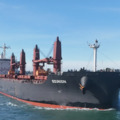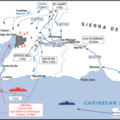Lebanon is a really impressive country, one of the smallest Arab states with her 10.400 square kilometers of territory (ranking 166th in the world), yet her diverse cultural composition, 20th century history and everyday events make Lebanon more interesting in herself than the rest of the Middle East. This country had been the Switzerland of the region, went through a 14-year bloody civil war which created specific political formations that could not have came into existence anywhere else in the world - like the (in)famous Hezbollah, the most effective guerrilla organisation in our days. Still if there is a fragile and endangered democracy in the Middle East, it is Lebanon.
This time we asked Dr George Emile Irani about the plans of Hezbollah, the Lebanese parlamentiary elections of 2009, the Lebanese parties and about the salafi extremists, who appeared in the country in the recent past. Mr. Irani is a Lebanese-American Middle-East expert, professor of political science and associate of the European Intitute of the Mediterranean (IEMed). He has published several books on this subject, and he has a blog on the Middle East hosted by the Spanish edition of Foreign Policy.
The Hungarian translation can be accessed here. We ask our readers to comment here in English and there in Hungarian.
--------------------------------------------------------------------------------------
[Katpol] We would like to start with questions about the Hezbollah. Hezbollah claims that it is not only a movement dedicated to liberating the occupied territories of Lebanon, but it also the only armed force capable of defending Lebanon. As far as we know the Lebanese Army lacks heavy equipment (for example their only jets are a half dozen obsolate Hawker Hunters) and recently a planned American weapon shipment for the Army was presumably vetoed/downgraded by the Israeli lobby. Is there a chance that America will change its policy and beef up the Lebanese army? Or will Lebanon find another arms supplier (France/Russia/China) and modernize her army on her own or simply keep relying on the military capabilities of Hezbollah in the long run?
[G. I.] Following the bloody clashes (summer 2007) between the Lebanese Armed Forces (LAF) and the Islamists in Nahr al Bared (Palestinian refugee camp) the Pentagon decided to supply the LAF with light weapons. Of the $410 million that has been committed since 2006 less than half has been delivered. There is currently disagreement between some elements in the State Department and the Pentagon on arms supply to the LAF. There is also heavy lobbying by the Israelis to stop heavy weapons delivery to the LAF. The fear is that US weapons could end up in Hezbollah's hands
[Katpol] Back in August Nasrallah said that they still planned to avenge the death of Imad Mugniyeh and that Israel could prepare for a "big surprise". Is it possible that Hezbollah really wants to make a spectacular attack on Israeli targets before the parlamentary elections or do they just use this war rhetoric to gain popularity and votes? After the Doha Agreement, internal stability may serve their interests better than the open confrontation with Israel.
[G. I.] No Hezbollah will not attack Israel at this stage to avenge the death of Mughniye. They are getting ready for another major round of war with Israel. Everything is frozen at this stage to wait for the results of elections in Israel, the US, Iran and Lebanon of course.
[Katpol] Not long ago Hezbollah's international relations official Nawaf Moussawi said that they intend to "liberate" seven villages in Northern Israel. These were part of what is now Lebanon until 1923 when a British-French agreement transferred them to Palestine - therefore Hezbollah says they just want to reestablish the "original border" again. However this move would be very significant, as for the first time, Hezbollah would fight for territories not occupied by Israel after 1967 but territories inside Israel. Do they really want to take this desperate step to ensure that the liberation of Lebanese soil would never be finished or is there something else behind these new claims?
[G. I.] This is mere propaganda. Hezbollah is getting ready to wage the electoral battle next summer in Lebanon and is in no mood to drag the country into another war. Keep in mind that the Iranian leadership is calling for moderation as witnessed recently by the visit of Lebanese President Michel Suleiman.
[Katpol] How would a potential agreement between Israel and Syria about the Golan Heights affect the position of Hezbollah ? Syria is not the main supplier of Hezbollah but still an important ally. Would Hezbollah follow Iran's policy in this case - which would be less than friendly towards Syria - or would it try to balance between them? And by the way, what is behind the current Syrian military build up on the Lebanese border in your opinion?
[G. I.] Negotiations between Syria and Israel are at a standstill and frozen until the outcome of current political situation in Israel is known. Unless the US opens up to Iran I do not foresee a split in the strategic alliance between Iran and Syria.
The Syrian military buildup is a signal to 1) the Lebanese government that Damascus is keen on getting back to its direct military presence in Lebanon. Politically, the Damascus regime has a large and influential network of allies. 2) A signal to the various salafist extremist groups operating in Tripoli that Syria will not accept their destabilizing presence especially after the recent bombing in Damascus. Keep in mind that this also part of the tensions between Saudi Arabia and Syria
[Katpol] With respect to Hamas and the Hezbollah: as far as we can see Hezbollah is a dedicated supporter of the Palestinian cause in words but less enthusiastic in deeds. Has Hezbollah helped Hamas effectively in any form (funds, equipment, training) since their last action in 2006 (which triggered a war with Israel)?
[G. I.] Yes there is a close coordination at all levels between Hezbollah and Hamas supported by Iran and Syria.
[Katpol] Many describe Hezbollah as a "state within the state" with its own military, media and, most importantly, social network - it has all the attributes of a functioning government. This, combined with the resistance, wins the "hearts and minds" of the people. Other big parties like the Mustaqbal also have their own - of course, smaller - militias and TV channels but we couldn't find any information on whether they provide the same social services as the Hezbollah. If they don't, why do they miss this opportunity to gain popularity with the masses?
[G. I.] Hariri's al Mustaqbal has a social services network mostly in Beirut and Sidon. However it is not as developed as Hezbollah's. Saudi Arabia has been helping Hariri and the Sunnis of Lebanon to maintain their influence. In addition to al Mustaqbal the Sunnis have a large social network like the al Maqassed Hospital and various other organizations. They do not enjoy however of the same amount of support Hezbollah does have.
[Katpol] Okay, let's talk about the upcoming events in 2009. In your opinion, will the results of the upcoming American and Israeli elections affect the Lebanese elections in 2009? (this part of the interview was made prior to the US elections - ed.)
[G. I.] Yes indeed US and Israeli elections will affect the outcome of next June's elections in Lebanon. A very important document just issued by the Israeli defense establishment recommends that Israel "should support moderate factions in Lebanon in next year's scheduled parliamentary elections, but not at the expense of Israel's interests."
[Katpol] Speaking of foreign influence: can we expect more serious interference from the aforementioned states or from France, Syria, Saudi Arabia in the Lebanese internal politics as the elections are coming? We mean interference beyond the usual level, something like the Hariri assassination in 2005.
[G. I.] There is a possibility that the Syrian regime will do its utmost to support its allies in the March 8 Movement. If the opposition wins in Lebanon you can kiss the Hariri Tribunal goodbye!
[Katpol] Some newspapers state that the Resistance and Development Bloc (the other name of the March 8 - ed.) has a good chance of winning the elections and gaining majority in the parliament, but others call this only fearmongering. In your opinion, will there be a change in the balance of power between March 14 and the RDB, even if not so radical? (Here can be found a map of the predicted results of the elections.)
[G. I.] I have my doubts I believe the current status quo between political forces in Lebanon will stay the same. However there are external factors that could alter this balance such as a possible Israeli attack against Iran and or Hezbollah and a collapse of the Palestinian Authority.
[Katpol] After Doha the tone in Lebanese politics has become somewhat unnaturally friendly - old enemies meet, smile, shake hands, like recently Hasan Nasrallah and Saad Hariri. Beneath the surface, is the mood really this optimistic in Lebanon? Furthermore won't this happy attitude of reconciliaton disappear after the elections? Or maybe sooner?
[G. I.] There is currently a modus vivendi worked out between Saad Hariri (Future Movement) and Sayyid Hasan Nasrallah (Hezbollah). The Shias will not force a total collapse of Sunni influence in Lebanon against Hariri's promise not to raise the issue of Hezbollah's weapons. On the other hand we will have a tough battle in Mount Lebanon between Jumblatt, Hezbollah, Aoun and Arslan (the other Druze chieftain).
[Katpol] Will we see a closer cooperation between General Michel Aoun's Change and Reform Bloc and the RDB - maybe a grand coalition?
[G. I.] Everything is possible. I would look at Iran and Syria's game in this whole scenario.
[Katpol] You have mentioned the Salafi extremists in Lebanon previously. Honestly, we are a bit confused about these movements. Fatah al Islam is the most often mentioned group in the media, sometimes linked to Al Qaeda, but they are Palestinians and thus not really popular in Lebanon. On the other hand there are reports of radical Lebanese sunni groups supporting Hariri and they are also associated with Al Qaeda every now an then. Could you tell us more about these groups? How much influence do they have, who are their main sponsors behind the scene? (For example the USA, Syria, Saudi Arabia, and the Future Movement have all been named as the supporters of Fatah al Islam, which is quite interesting, to say the least.)
[G. I.] Salafi groups emerged in Lebanon in the last few years. They have been mostly concentrated in Northern Lebanon and the Palestinian refugee camps. The most prominent was the group Fatah al-Islam created in November 2006 by Chaker al-Abssi a former member of Fatah who later split from Arafat's group to create Fatah Al-Intifada. Abssi left for Iraq where he joined al Qaeda's Zarkawi. Back in Lebanon Abssi and his group Fatah al-Islam played on the miserable socio-economic conditions in the Palestinian camp of Nahr El Bared. Funded by a wide network of salafists including some Arab governments Fatah al-Islam waged a deadly war against the Lebanese Army in spring 2007. Following a battle that lasted 3 months Fatah al Islam was defeated and its chief disappeared. Still some of his followers are still active in Palestinian camps in Lebanon. Salafi groups resent the fact that Shiites in Iraq collaborate with US occupation troops while in Lebanon Hezbollah has the exclusive right to fight Israel. Such salafi groups could not exist if not for the support of intelligence networks from neighbouring countries. They have no chance to grow given that their appeal is limited and Lebanese Sunnis are in no mood to be sucked into another useless confrontation with the Shias.
[Katpol] In general, can we be optimistic about Lebanon's future?
[G. I.] See the conclusions of my last paper on Lebanon: "The Lebanese polity is faced today with two clashing visions. The first is a neo-liberal vision based on respect for basic freedoms and an economy based on a capitalist free market; in short, a country reflecting the Swiss model on the shores of the Mediterranean.
The other vision is that of a religiously-inspired Sparta whereby a totalitarian religious ideology, in this case that of Hezbollah, predominates supported by Iran. Hezbollah would like to create an Islamic-inspired state that would give the Shia community in Lebanon its overdue role in power sharing. Basically, we have in Lebanon today the clash between a pro-Western Swiss model confronting a Spartan political and military Iranian-inspired model. The outcome of this clash will determine the future of the country."
[Katpol] Our last question is not about a strictly Lebanese affair but a rather dangerous possiblity in the Middle East: There are rumours that Israel may attack Iran to halt its nuclear program before the inauguration of Barack Obama in 20th of January to create a fait accompli for the new president. Despite the constant threats the Israeli administration makes, the chances of such an action are low, but still the consequences would be disastrous for the whole region, if not for the world. Would Israel go this far to preserve its nuclear monopoly in the Middle East?
[G. I.] Highly unlikely till next summer if it happens. The US and the new Obama administration is in no mood to destabilize Iran at this stage given Obama's goal to get US troops out of Iraq. Tehran's help will be needed also in Afghanistan.







Utolsó kommentek